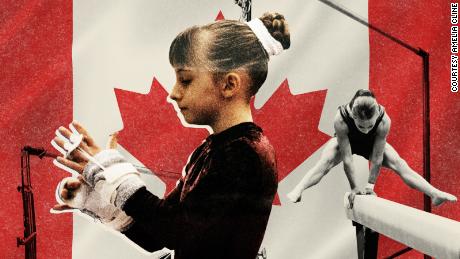‘Straight up child abuse’: Canadian gymnast quit at the age of 13 due to what she alleges was a horrific and abusive environment

“I was fearless,” she told CNN from her home in Vancouver. “Every child likes to learn how to flip, all of my early memories are pretty happy and joy-filled, which they should be.” At the age of two, Cline says that her interest was obvious to her parents by the way she’d be pulling “little baby chin-ups,” at the kitchen counter.Soon she had developed into a serious athlete. By the time she was nine or 10, Cline had outgrown her local coaches and was now travelling an hour from home to train at an elite club.For a while, her love of the sport continued, but Cline says everything changed when Vladimir Lashin and his wife Svetlana arrived as the new coaching team. Cline says that the mood in the gym quickly darkened. “Immediately, it was verbally abusive,” she recalled. “If you made any mistakes, they would scream and humiliate you. ‘This is rubbish, you’re rubbish,’ screamed at you over and over again.” According to Cline, it wasn’t long before the coaches resorted to physical abuse, too. “I was warming-up [for a standing split] and my hamstring felt really tight, and he got really annoyed. “He said something along the lines of, ‘You’re just faking, trying to get out of doing this stretch,’ so he turned me around, grabbed my leg and forced it behind my ear.”Cline can still recall the primal scream and the blinding pain, describing the sensation as “excruciating.””It snapped my hamstring completely and took part of my pelvis with it,” she adds.As the alarm bells in her sensory receptors began to register the searing pain, Cline says that her coach offered no apology or remorse.”He was angry, he screamed at me,” says Cline, adding that he accused her of lying and tried to distance himself from any responsibility for her shocking injury. “There was no offer of medical treatment, no one called my parents. I think I ended up having to limp to the change room myself and call my parents to take me to the hospital,” she says.CNN reached out to Cline’s former coaches, who it’s believed have left Canada.Multiple requests for comment were sent via email and to their Facebook pages, but there has been no reply.Barely a teenager, Cline became accustomed to a grueling schedule and painful injuries — she says she broke her hand in three places and tore a muscle in her spine that left her with a clot the size of a baseball. Cline would attend school in the morning, then train from 1 p.m. until 6 p.m. before catching up on homework in the evening, often spending 30 hours a week in the gym. She recalls that to give the appearance that her knees weren’t buckling on landing, which would result in a points deduction by the judges, the coach worked with her to permanently hyper-extend them. With her feet on an elevated box and her legs raised from the floor, and she says Lashin would sit on her knees for several minutes at a time. She estimates that he weighed around 200 pounds. It’s almost 20 years since she walked away from the sport she had once loved, but Cline says she is still constantly tormented by it — both emotionally and physically.There’s the debilitating back pain since the age of 14, the arthritis in her neck, she says she has nightmares and is constantly on the brink of an eating disorder. “I don’t weigh myself,” she reveals, “I can never get on a scale. Even if I’m at the doctor, I ask them not to tell me the number. It has required constant vigilance to make sure that I’m not slipping into really harmful eating patterns.”I’ve talked to dozens and dozens of girls and boys and they very much struggle in adulthood, whether it’s eating disorders or PTSD or depression or self-harm addiction. “And, of course, the debilitating physical pain. This doesn’t just stop because someone has quit the sport, it’s something that’s going to continue to plague these people for the rest of their lives.” Cline concedes that the sport of gymnastics will always present a risk of injury, but she believes that such injuries would be mitigated with healthy training methods. And she certainly doesn’t think that the psychological trauma should be inherent to the sport. “Elite sport is hard,” she concludes, “But it shouldn’t ever produce things like eating disorders, self-harm and PTSD.”





